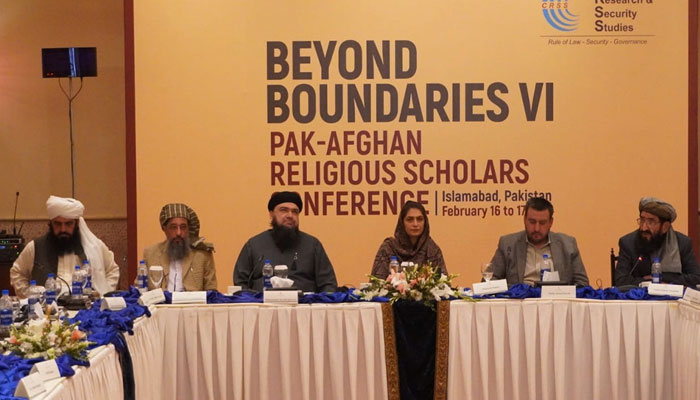‘Understanding and collaborative efforts must for stable Pak-Afghan relations’
Islamabad: Pakistan-Afghanistan Religious Scholars Conference has developed a consensus on the need for sustained efforts to address humanitarian crises, promote dialogue, and build trust between two sides.
The conference was organised here by Centre for Research and Security Studies (CRSS) in collaboration with its Afghan partner Organisation for Economic Studies and Peace (OESP), as part of their initiative Beyond Boundaries. Dr Qibla Ayaz, Chairperson, Council of Islamic Ideology (CII), emphasised the importance of religious diplomacy and the role of scholars in addressing bilateral issues between Pakistan and Afghanistan. Based on his experiences of participation in various delegations and dialogues aimed at promoting girls' education, both domestically and in Afghanistan, he stressed the need to engage with key stakeholders, including religious leaders who possess the influence and understanding to contribute meaningfully to resolving bilateral issues.
Maulana Muhammad Tayyab Qureshi, Khyber-Pakhtunkhwa Chief Khateeb, noted that the way forward for the relationship between Pakistan and Afghanistan lies in both sides proactively addressing mutual concerns and taking conscious efforts to promote cordial ties between them at different levels of the relationship, including people-to-people contacts, economy and politics.
He stressed the importance of addressing the insecurity and humanitarian crises plaguing the region, particularly the desire among the young members of the population to leave due to economic hardships. Additionally, he advocated for empowering women and promoting education, citing examples of Muslim-majority countries where progress was achieved through a balance of religious and formal education.
Abdul Hakim Mujahid, former Afghan Diplomat, shed light on Afghanistan's dire humanitarian situation, calling for the lifting of sanctions to tackle the crisis and economic challenges effectively. He suggested integrating the Afghan Taliban into the global fabric to effectively combat terrorism and ensure stability. Maulana Hamid-ul-Haq Haqqani, Vice Chancellor, Dar-ul-Uloom Haqqani, Akora Khattak, advocated inclusive policies that promote education and empower women, recognising crucial role of education in fostering socioeconomic stability and peace.
Mufti Jamaluddin, former JUI MNA emphasised that the cultural and religious similarities between Pakistan and Afghanistan can bind the two nations into a relationship characterised by cooperation, trust, and understanding.
-
 What You Need To Know About Ischemic Stroke
What You Need To Know About Ischemic Stroke -
 Shocking Reason Behind Type 2 Diabetes Revealed By Scientists
Shocking Reason Behind Type 2 Diabetes Revealed By Scientists -
 SpaceX Cleared For NASA Crew-12 Launch After Falcon 9 Review
SpaceX Cleared For NASA Crew-12 Launch After Falcon 9 Review -
 Meghan Markle Gives Old Hollywood Vibes In New Photos At Glitzy Event
Meghan Markle Gives Old Hollywood Vibes In New Photos At Glitzy Event -
 Simple 'finger Test' Unveils Lung Cancer Diagnosis
Simple 'finger Test' Unveils Lung Cancer Diagnosis -
 Groundbreaking Treatment For Sepsis Emerges In New Study
Groundbreaking Treatment For Sepsis Emerges In New Study -
 Roblox Blocked In Egypt Sparks Debate Over Child Safety And Digital Access
Roblox Blocked In Egypt Sparks Debate Over Child Safety And Digital Access -
 Savannah Guthrie Addresses Ransom Demands Made By Her Mother Nancy's Kidnappers
Savannah Guthrie Addresses Ransom Demands Made By Her Mother Nancy's Kidnappers -
 OpenAI Reportedly Working On AI-powered Earbuds As First Hardware Product
OpenAI Reportedly Working On AI-powered Earbuds As First Hardware Product -
 Andrew, Sarah Ferguson Refuse King Charles Request: 'Raising Eyebrows Inside Palace'
Andrew, Sarah Ferguson Refuse King Charles Request: 'Raising Eyebrows Inside Palace' -
 Adam Sandler Reveals How Tom Cruise Introduced Him To Paul Thomas Anderson
Adam Sandler Reveals How Tom Cruise Introduced Him To Paul Thomas Anderson -
 Washington Post CEO William Lewis Resigns After Sweeping Layoffs
Washington Post CEO William Lewis Resigns After Sweeping Layoffs -
 North Korea To Hold 9th Workers’ Party Congress In Late February
North Korea To Hold 9th Workers’ Party Congress In Late February -
 All You Need To Know Guide To Rosacea
All You Need To Know Guide To Rosacea -
 Princess Diana's Brother 'handed Over' Althorp House To Marion And Her Family
Princess Diana's Brother 'handed Over' Althorp House To Marion And Her Family -
 Trump Mobile T1 Phone Resurfaces With New Specs, Higher Price
Trump Mobile T1 Phone Resurfaces With New Specs, Higher Price




